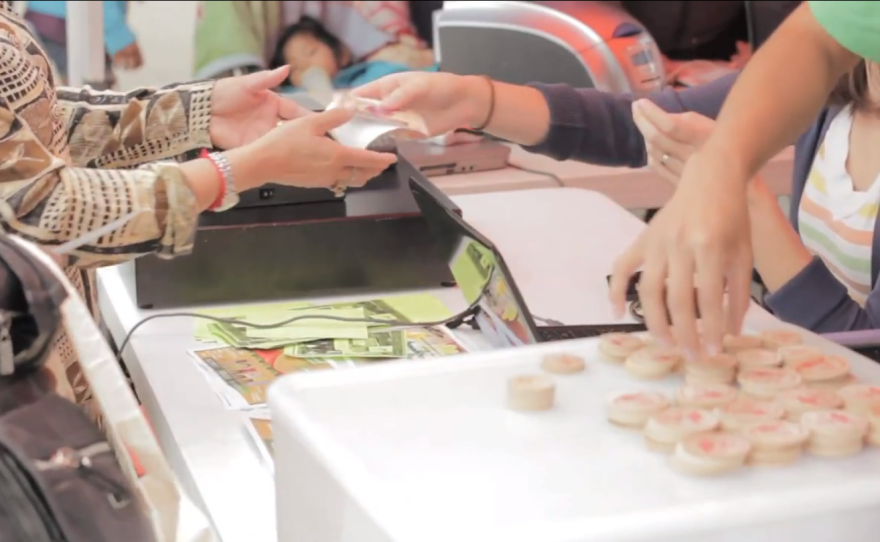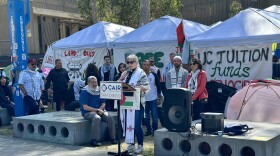Vincent Rivera has been volunteering weekly at the City Heights Farmers Market for almost two years. He helps an organization called Eat City Heights prepare and sell produce bags filled with fruit, vegetables and eggs bought from the market vendors. The $15 bags help support farmers and the community, while being more flexible than traditional Community Supported Agriculture (CSA) programs that require weeks- or months-long subscriptions.
Eat City Heights' take on CSA drives home the market's larger mission: making fresh produce more accessible and affordable. But Rivera said that goal has faced some setbacks.
Fresh Fund – the market's dollar-for-dollar match for food stamps, which has been credited with the market's success serving the low-income community – has seen major cuts.
“I’ve heard that because of the changes, less people come to the market,” Rivera said.
On Saturday, the market will celebrate its fifth anniversary serving the mid-city community. But it will do so without some of the original draw that got it touted nationally for making a farmers market work in a low-income community.
As one of the first farmers markets in the country to accept food stamps and the first in San Diego to accept public-assistance dollars, the market set the stage for similar programs throughout the nation, and has proven naysayers wrong with its strong turnout of low-income shoppers, whom many doubted would support the kind of market traditionally associated with middle- and upper-income neighborhoods.
The Fresh Fund, which launched in 2008, has been one of the major selling points. But changes in the way it's administered has cut enrollment by nearly 75 percent. The program is now open for a limited time to new enrollees only.
The program was initially sponsored by Health and Human Services as a double-value coupon program where participants in CalFresh (also known as food stamps or SNAP), Women and Infant Children (WIC) food aid and disability aid called Supplemental Security Income (SSI) could qualify for match dollars, boosting the amount of fresh fruit and vegetables they could buy indefinitely.
Fresh Fund grew exponentially, essentially becoming an overnight success. It had more than 8,000 participants enrolled at its peak. A 2010 grant from the Centers for Disease Control and Prevention enabled an expansion to five markets around San Diego County.
At the time, anyone who was eligible could receive up to $20 a month for as long as they stayed in the program. Market Coordinator Troy McKinney said the offer was “unsustainable.”
After blowing through the one-time grant, Fresh Fund took a hiatus so organizers could rethink the program, according to McKinney.
“We were able to secure more funding,” he said. “We structured more sustainably because we are trying to make the program accessible to as many as possible.”
Currently, Fresh Fund is supported by the International Rescue Committee and is limited to three months for new members only. It matches $15 a week for up to six weeks. Program participants must use the match money within three months. The IRC has also limited the program to its El Cajon and City Heights markets.
In 2012 enrollment was just shy of 400 participants. Currently, there are 108 Fresh Fund members in City Heights.
McKinney said the IRC’s goal for the Fresh Fund is to never have to turn anyone away from the program. But former participants are being turned away.
“When their membership ends, it’s hard,” he said. “Unfortunately because of limited funding the program does end, even when they still might need it.”
Market Manager Norah Duffy said those who participated in the program in the past say they would like to benefit from it again.
“All of those who have done it in the past can’t do it again,” she said. “They still come up and ask every week [if they can participate] but they understand [that they can’t].”
Organizers are seeking other grants and fundraising efforts. In the meantime, Duffy said that all of the market vendors pay an extra fee that goes directly into the Fresh Fund.
“They understand that fee to be benefiting the community and ultimately their businesses,” Duffy said.

Farmer Eli Hofshi is one of the original vendors of the market and said he has witnessed the effects changes to the Fresh Fund have had on the market. He said the program currently doesn’t seem to make sense for the needs of the community.
“I don’t think it’s comparable to what they have done in the past,” Hofshi said. “I think the Fresh Fund currently is irrelevant.”
But Hofshi said that without the initial success of the Fresh Fund, the market wouldn’t be what it is today. He said it's what has made the market grow quickly. Hofshi said many of his original patrons are still loyal customers because of the relatively inexpensive prices.
La Mesa resident Faduma Ismail said she's been coming to the market for the past four years because of the prices. She buys what seems like a lot of fresh fruit, vegetables and greens, but said it is just enough to last through the week.
She said she believes the market prices are much cheaper than most grocery stores. And that makes the market more accessible to the immigrant community in particular.
“A lot of immigrants think that organic food is expensive but this food isn’t,” Ismail said. “Locally grown food creates a healthier community.”
The City Heights Farmers Market celebrates its fifth anniversary on Saturday, but will host a formal celebration with cultural activities, children's entertainment and contests Aug. 17.
The current enrollment period for Fresh Fund goes until October.






